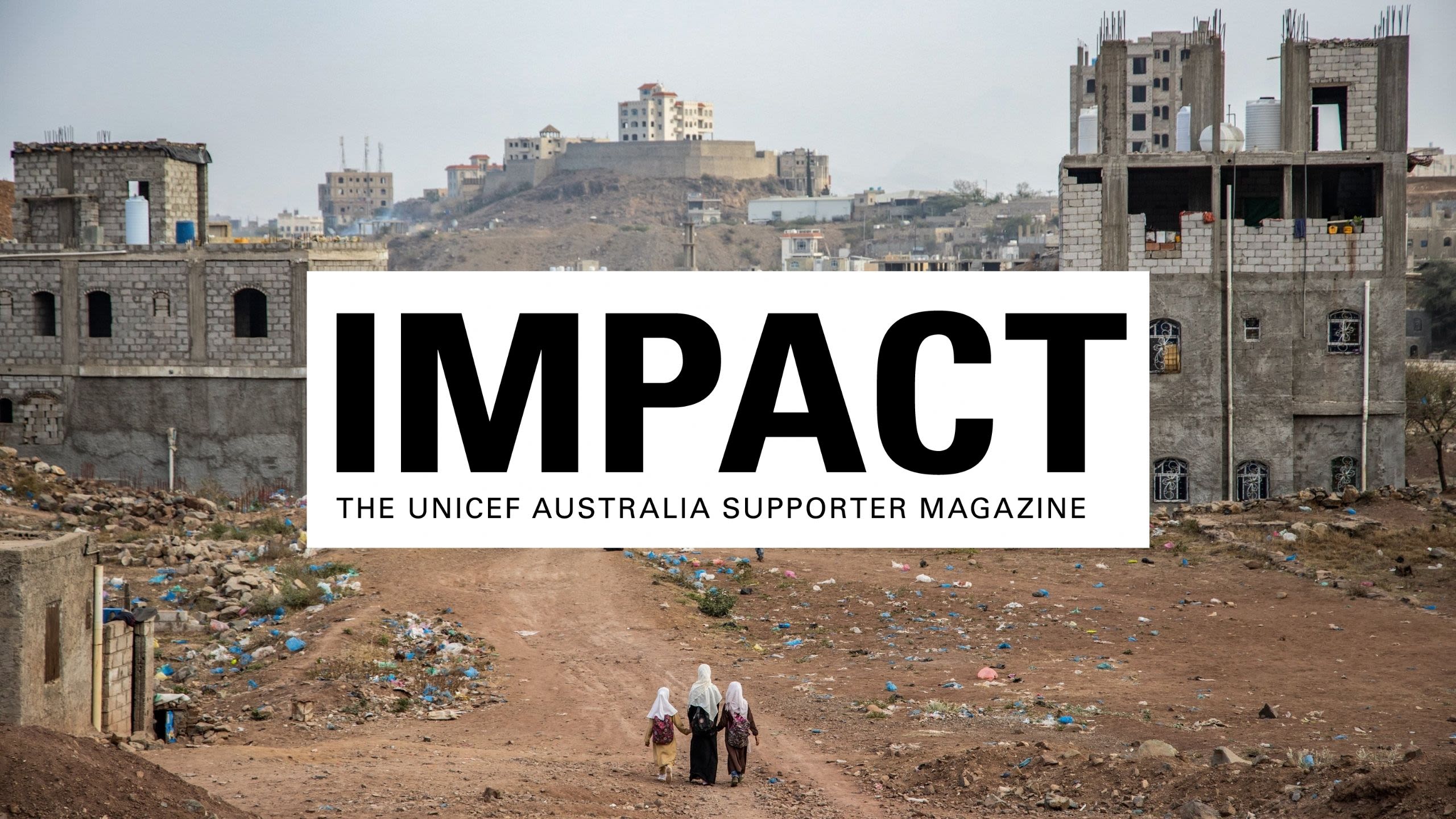
Welcome
Happy 2022 to you and your families. Thanks to incredible supporters like you, last year we improved the lives of millions of children and rushed emergency supplies to those in the greatest need.
We are living in a crucial time when the human rights of children are under threat to a degree that has not been seen in more than a generation. At UNICEF Australia, our work is possible entirely because of voluntary donations from people like you. Your support has never been needed more.
In August 2021, a UNICEF report found that an estimated 850 million children live in areas with at least four overlapping climate and environmental shocks. It was amazing to see young people raise their voices at COP26 and speak up for our planet. These are the voices of our future leaders.
2021 also saw the majority of Australians getting vaccinated against COVID-19, but vaccine inequality is growing by the day in low-income countries. Papua New Guinea, Yemen and Uganda have yet to vaccinate 10 per cent of their population, but we are working to change that.
As a key member of COVAX, UNICEF has now helped to deliver more than 1 billion vaccines to 144 countries. Our ‘Give the World a Shot’ campaign has raised over $2.5m, enough to vaccinate well over one million people – thank you for standing up for the most vulnerable.
We were also thrilled to be involved in the launch of the National Children’s Mental Health Strategy alongside the Australian Government. We cannot underestimate the impacts of the pandemic on children’s mental health and this plan offers practical pathways for early prevention and access to support.
Our 2022 plan is all about determination. Determination to protect every child, no matter what. Whether it’s a devastating COVID outbreak in India, threats to girls’ education in Afghanistan or ongoing vaccine inequality, we will be there for children.
There are some incredible stories in this edition of Impact that show how much we can achieve when we work together. Wishing you and your loved ones a fantastic 2022.
Tony Stuart,
Chief Executive Officer


Tony Stuart, Chief Executive Officer
Tony Stuart, Chief Executive Officer
NEWS UPDATES: Africa & Middle East
Afghanistan
Afghanistan is one of the most dangerous places to be a child. Last year conflict, drought and COVID-19 collided, making life incredibly difficult for children and families.
More than 667,000 people have been forced to flee their homes and UNICEF estimates that 1 in 2 children under five will be acutely malnourished in 2022. Nearly a quarter of the country lack access to basic drinking water and half lack access to basic sanitation.
But in times of crisis, generous Australians like you step up. You helped us to deliver safe water to drought affected communities, routine vaccinations, health care to hard-to-reach areas, and life-saving treatment for malnutrition.
After more than 65 years, our teams remain on the ground in Afghanistan delivering for every child. In that time, we have built trust with everyone we need to get the job done across 13 offices nationwide. With your help, we have provided life-saving support for the children of Afghanistan and will continue to do so.
Thank you for responding so generously and urgently in this time of crisis, we could not reach vulnerable children in Afghanistan without you.

In 2021 in Afghanistan, you
helped us to provide:
134,600 children and caregivers with mental health and psychosocial support.
295,944 children with life-saving treatment for severe acute malnutrition.
758,701 children with education, including early learning.
Want to support the children of Afghanistan?
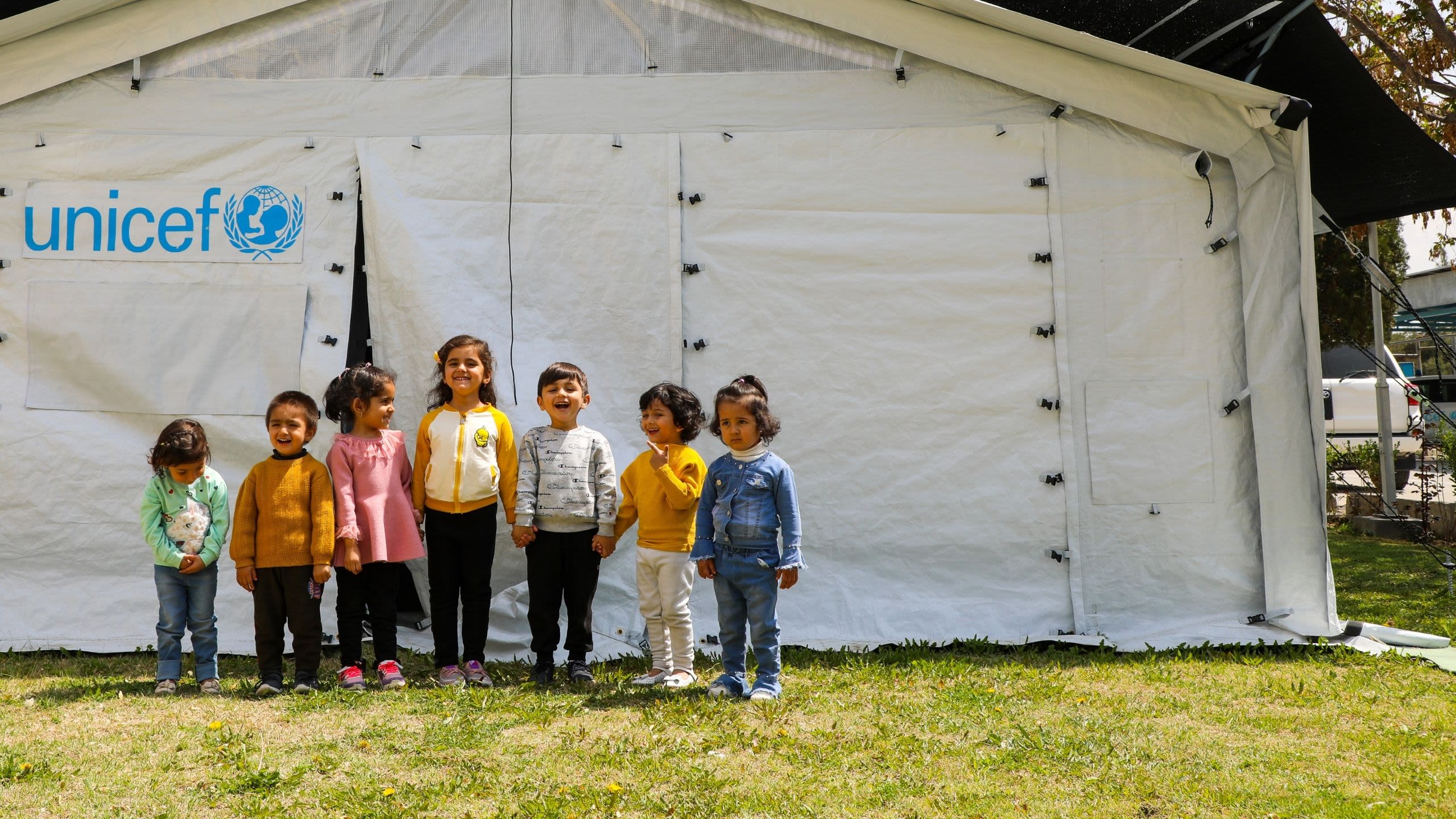

Vaccine equity
As Omicron spreads and global vaccination rates climb, low-income countries are falling behind. In the African continent, only nine per cent of the population is fully vaccinated.
Globally, 775 million booster shots have been administered, but in Africa only 320 million have received their first dose.
Strained health systems, closed schools and delayed childhood immunisation programs are affecting children’s lives. Families are struggling to maintain their income, increasing rates
of poverty.
UNICEF is on the ground training health care workers, providing personal protection equipment, syringes and the infrastructure to store and transport vaccines safely.
Until everyone has access to vaccines, none of us are truly protected.
Ethiopia
The worsening political crisis and escalating violence in Ethiopia has displaced millions and increased rates of poverty and malnutrition. 14 million children in Ethiopia need humanitarian assistance.
COVID-19 and ongoing conflict in the Tigray region have closed schools. More than 500 schools have been destroyed and many are being used as temporary shelters for displaced families. There is a critical lack of teaching, learning materials and school furniture.
In 2021, UNICEF worked to find alternative learning locations for children. UNICEF supported 191,553 emergency-affected children with education and child protection services.
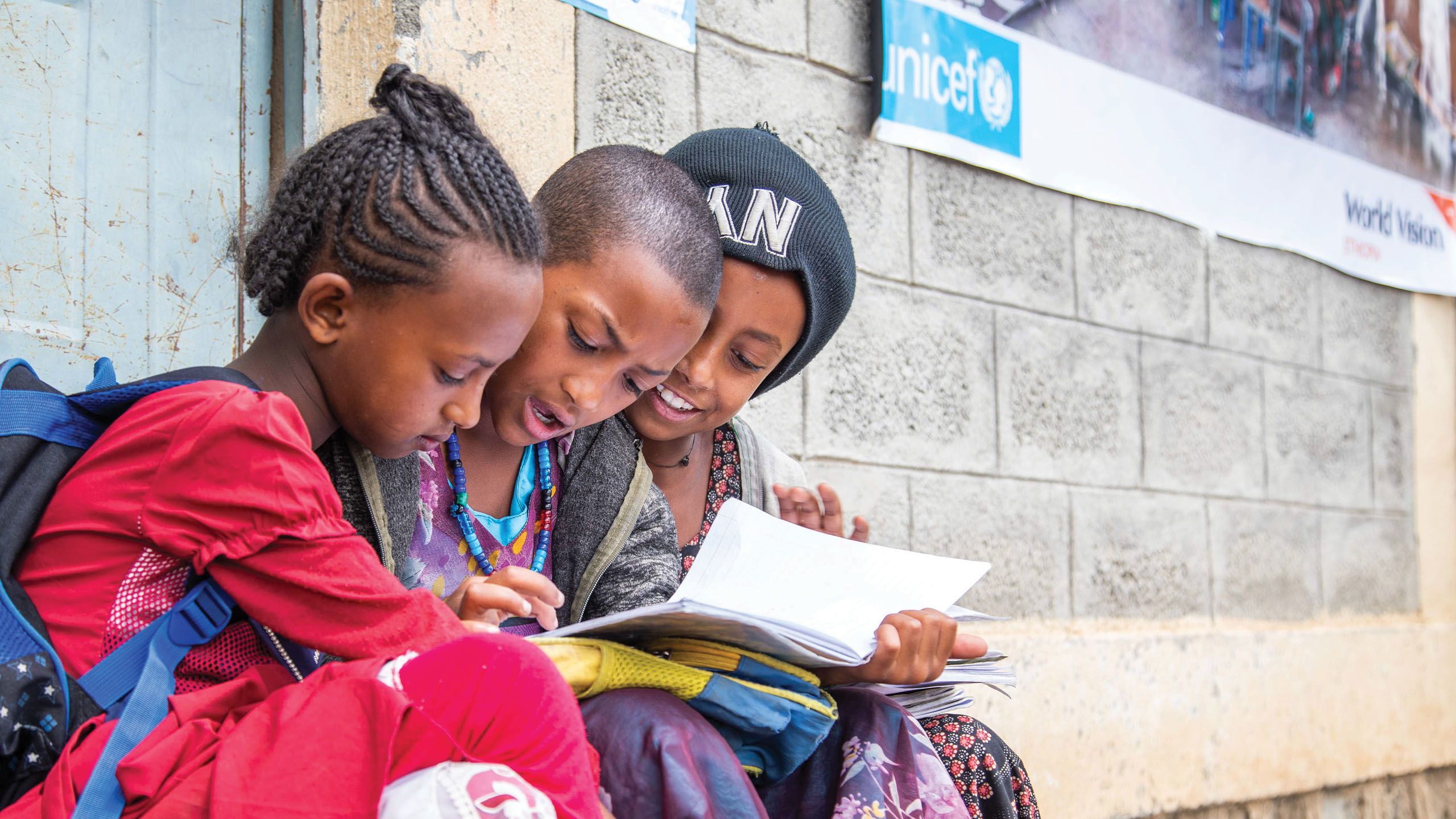
PRIORITY PROGRAMS: Africa
From the classroom,
to the kitchen
The STEM program building futures in Burundi

In Burundi, a landlocked country between Rwanda, Tanzania and the Democratic Republic of the Congo in East Africa, 90 per cent of people live in rural areas. Many families still cook on open fires, which uses a lot of firewood and causes health risks due to smoke inhalation. Women and girls are often responsible for collecting firewood, which can put them in danger and take time away from their studies.
The Creatable program, supported by UNICEF Australia, teaches innovation, and science, technology, engineering and mathematics (STEM) to high school students to help solve real world problems.
Let us introduce you to the rocket stove. This STEM solution is an effective, affordable and safe alternative to cooking on an open fire. Its development means young people spend more time learning in school than risking their health and safety to collect and burn firewood every time they eat a meal.
Local Creatable student Jean Baptiste is passionate about supporting his family to have access to the rocket stove with his new skills.
"If I visit my relatives, I will build them an improved stove," he says. My wish is that this kind of course can be accessible to all Burundian students."
Creatable in Burundi is a comprehensive and inclusive school-based program created in partnership with Australian production company FINCH that teaches innovation and STEM to adolescents.
Creatable first started in Sydney schools and is now being taught in Burundi to 1,000 students across 10 schools in 10 provinces.
What is a rocket stove?
Watch the short documentary on how the
rocket stove is changing lives.

Burrundi, a country located in east-central Africa.
Burrundi, a country located in east-central Africa.

Ange, 13, adds firewood to her rocket stove while cooking at home. © UNICEF Burundi
Ange, 13, adds firewood to her rocket stove while cooking at home. © UNICEF Burundi
"In this course, the improved stove
allowed us to see the world differently."
- Gislaine, Creatable student

In the past, Burundi has been marked by decades of conflict and political instability. Although today the country is mostly at peace, about 65 per cent of the population live below the national poverty line and education opportunities are limited for young people.
In Burundi, only half of students complete secondary school and access to quality STEM education is challenging, particularly for girls. Gislaine (pictured above), is a student who used to collect wood in a field five kilometres from her home multiple times a week. Thanks to your generous support, more young girls like Gislaine are participating in STEM subjects, while also improving their day-to-day lives.
“Now I only go there once a week,” says Gislaine. “Once you use this improved stove, you can’t go back.”
As a new Priority Program for UNICEF Australia, this program is possible because of generous people like you.
GLOBAL PROGRAMS: Middle East
Protecting children living in
The world's worst
humanitarian crisis

In Yemen, 11 million children are in urgent need of humanitarian assistance.
For seven years, children’s lives have been plagued by conflict, economic decline, displacement and now the compounding effects of COVID-19. Thanks to generous supporters like you, our teams have reached children in Yemen with life-saving supplies.
We won’t stop until we reach every child
– no matter what.
Meet three
extraordinary kids
Ibrahim, 17
Ibrahim, is one of the 10,000 children who have been killed or injured since fighting started in Yemen in March 2015. Ibrahim was tending to his family’s sheep when he stepped on a land mine.
"My sister was shouting ‘Ibrahim! Ibrahim!’. I shouted ‘I have no legs’ and she carried me. She took me home and then the people in my village took me to the hospital.”
At the hospital, Ibrahim underwent an operation for his legs. “After [the] operation, I woke up and did not see my legs. I was very sad and upset because I could not play with my friends as they do,” he says.
“After getting these artificial limbs, I am happy I can walk by myself.”
Your support has helped hundreds of vulnerable children like Ibrahim in Yemen who have survived life-changing injuries. Our teams continue to provide psychosocial support and mine risk education to make sure every child is safe and protected.


Yamamah, 13
In Yemen more than 2 million children are unable to access an education due to conflict and COVID-19. Yamamah, is one of the lucky ones and the only girl in her family who goes to school.
When schools closed during the pandemic, Yamamah was eager to return to learning. “I used to read the lessons and prepare them, so when I got back to school, I could participate with the teachers in the classroom,” she says.
You are providing children with education in Yemen through UNICEF-supported rebuilding projects, providing clean water facilities, learning materials, and supplementing teacher’s salaries.
Yamamah knows it’s important that teachers are valued. She believes that they should receive salaries, “so they can feel proud that they are teachers.” More than 170,000 teachers in Yemen have not received a regular salary for more than four years.
Yamamah wants to continue studying and dreams of becoming a doctor.
“Through medicine, I can provide help to people who are poor and cannot get medical help."

Zoya, 1
Zoya is one of the 2 million children displaced across Yemen. She is also one of the 2.3 million children under five facing severe acute malnutrition.
Her family live in harsh economic conditions, struggling to access adequate food, clean water and shelter.
Thankfully, Zoya’s parents found a UNICEF-supported health clinic where compassionate health workers cared for her and diagnosed her with malnutrition. They were able to provide her with treatment free of charge and get her on the road to recovery.
"But since she came to the hospital for treatment, her condition is improving. I hope my daughter recovers completely.”
People like you have supported more than 4,000 health care centres in the country to provide relief to children and families dealing with severe acute malnutrition.

PRIORITY PROGRAMS: Pacific
Why vaccination is an issue that hits home
Ambassador and rugby player Will Genia speaks up

As a proud Papua New Guinean, it is incredibly difficult to see my home country facing the devastation of the COVID-19 pandemic as other countries open up and return to some kind of normal.
With cases and deaths dramatically rising in the tens of thousands, less than 3 per cent of the more than 9 million people living in Papua New Guinea (PNG) are vaccinated as I’m writing this in late 2021.
Hospitals around the country and in the communities where I grew up are under huge stress with vital supplies running low. Health workers are exhausted, and many have been infected.
Low vaccination rates are caused by lack of access to vaccines, with many people having to walk for hours to reach health centres, but also by misinformation shared widely amongst communities in PNG. Misinformation travels quickly and is generated by unreliable sources that are costing people their lives.
This is why I am using my voice to speak up.
UNICEF is working in low-income countries around the world to make sure everyone has access to vaccines. As part of COVAX, they’ve delivered more than 1 billion vaccines to more than 144 countries so far.
We all have a role to play in stopping the spread of misinformation so that people feel confident to get vaccinated. I believe it’s important to empower people with the correct information and create spaces where they can express how they feel. Working with UNICEF Australia has meant I can educate myself about COVID-19 and vaccinations, share this knowledge, and start positive conversations online and in my own community.
When people know the facts and feel comfortable to have conversations with their doctor or health workers, they feel more confident to roll up their sleeve.
Protecting communities from COVID-19 is a global issue, but also one that hits close to home. As a son, brother and dad, it’s heartbreaking to watch communities at home in PNG lose their loved ones. My mum and brother had COVID-19, and sadly some of my cousins and friends have also passed away from the disease.
It’s particularly devastating for all the kids who are losing grandparents, parents and carers.
We must protect everyone, especially the people keeping children safe, educated, and healthy. The children of PNG, and here in Australia, cannot afford to have their futures disrupted yet again.
We know vaccination saves lives and that it is the best way to protect ourselves, our loved ones and our communities from the life-threatening spread and effects of COVID-19.
I encourage everyone to go out and get their shot. You can also donate to UNICEF Australia’s ‘Give the World a Shot’ campaign so that every community has access to vaccines, because this pandemic is not over for anyone, until it is over for everyone.

The first batch of COVID-19 vaccines arrive in Papua New Guinea in April 2021. © UNICEF/UN0439487/Vatava Media
The first batch of COVID-19 vaccines arrive in Papua New Guinea in April 2021. © UNICEF/UN0439487/Vatava Media

Students at a Port Moresby school continue learning through the COVID-19 pandemic. © UNICEF/UN0512769/Chambers
Students at a Port Moresby school continue learning through the COVID-19 pandemic. © UNICEF/UN0512769/Chambers
With your help, since 2020 our teams have provided Papua New Guinea with:
Cold chain equipment, distribution and installation to store doses for routine and COVID-19 vaccination in 22 provinces.
Frontline workers with critical COVID-19 supplies and logistics to protect against infection.
Thousands of children and their families with ongoing mental health and psychosocial support.
More than 173,000 people with two doses of the COVID-19 vaccine.

PRIORITY PROGRAMS: Australia
More than just
a teddy bear
How we’re helping
Aussie kids heal from
Black Summer bushfires
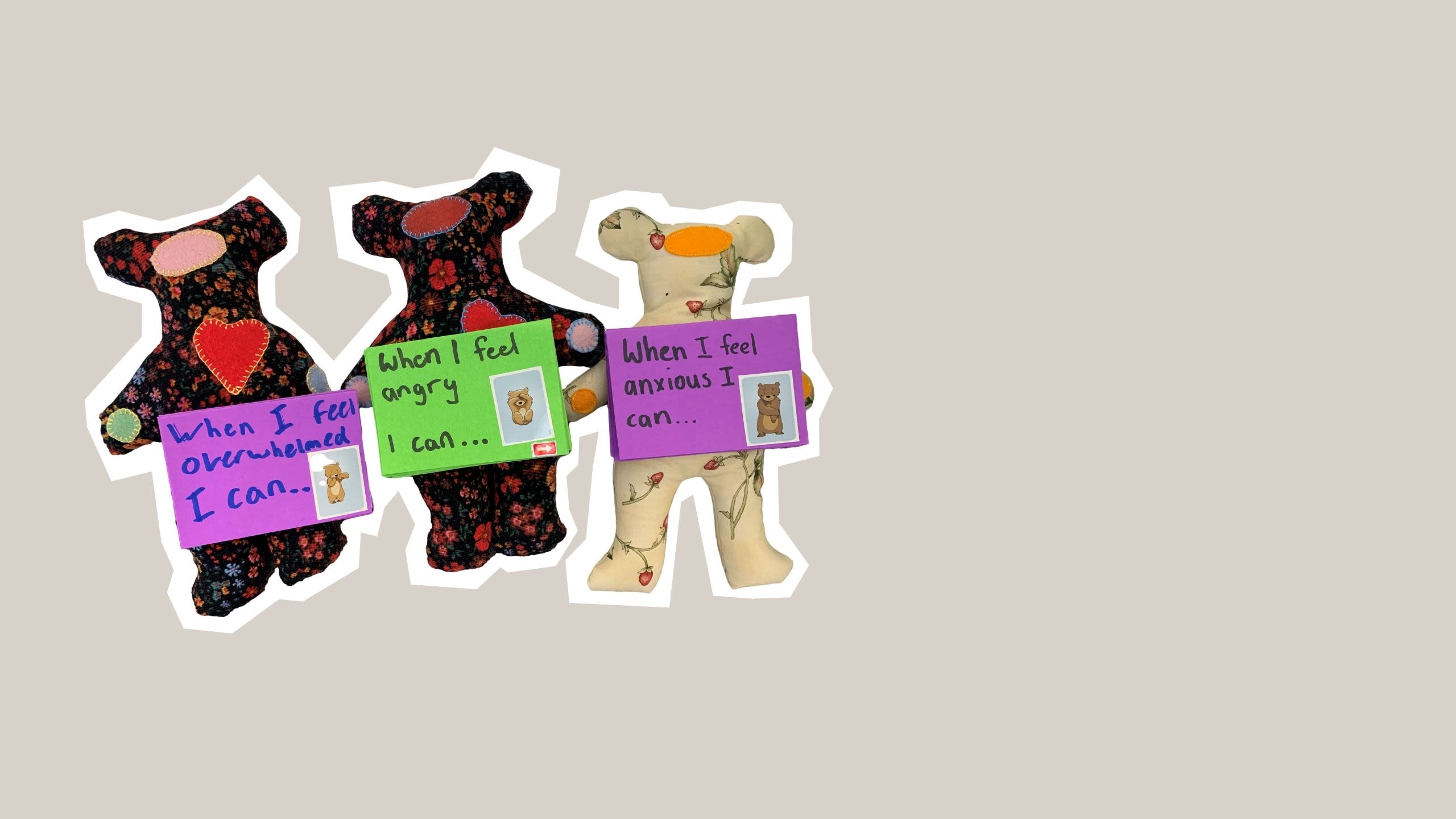

Sarah and Billie from Royal Far West with toys and books they use in group sessions. © Royal Far West
Sarah and Billie from Royal Far West with toys and books they use in group sessions. © Royal Far West
Two in five Australian children and young people were impacted by the 2019-2020 bushfires.
Trauma from natural disasters can impact their mental health, education and overall wellbeing. One of the most effective recovery methods used by our teams is Think Feel Do bears.
These sensory toys are filled with rice and decorated with three patches to represent a brain for thinking, a heart for feeling and paws for doing. Thanks to your support, we work with our partner Royal Far West to bring psychosocial support to communities hardest hit by the fires.
We sat down with Occupational Therapist Billie to understand how these small toys are making a big difference.
UNICEF: How have you seen this disaster impact children?
Billie: Initially, kids were a lot more sensitive and wanted to be close to their family. Some were easily triggered by a sunny or windy day, or the sound of a siren. Following the fires, COVID-19 impacted all the communities and led to school closures and less opportunities for social interaction. This was a big challenge as social supports are an important contributor to recovery.
UNICEF: How do Think Feel Do bears help children recover?
Billie: We get kids to share their thoughts and feelings or think about what they could do to help themselves when they feel a certain way. At the end, the kids choose a bear to take home. This opens a conversation between kids and their family with the bear acting as a safe tool for communication. Quite a lot of kids lost their homes and their favourite toys during the fires. Giving them something that is theirs and that may be replacing something that they lost – that is a nice part of it.
UNICEF: How do you reach children with support?
Billie: We work closely with about 30 schools and several pre-schools. We go on outreach visits to the communities, and we work with the school to meet the needs of children, families, and educators. We do group work with the kids, and workshops with educators and parents to help them understand how they can support their children. After the visit, we do follow up therapy through tele-health.
Thanks to your support,
we have reached:



Want to get involved?
Royal Far West is seeking volunteers to help make Think Feel Do bears.
PRIORITY PROGRAMS: Australia
Youth Voices
A report for children, by children
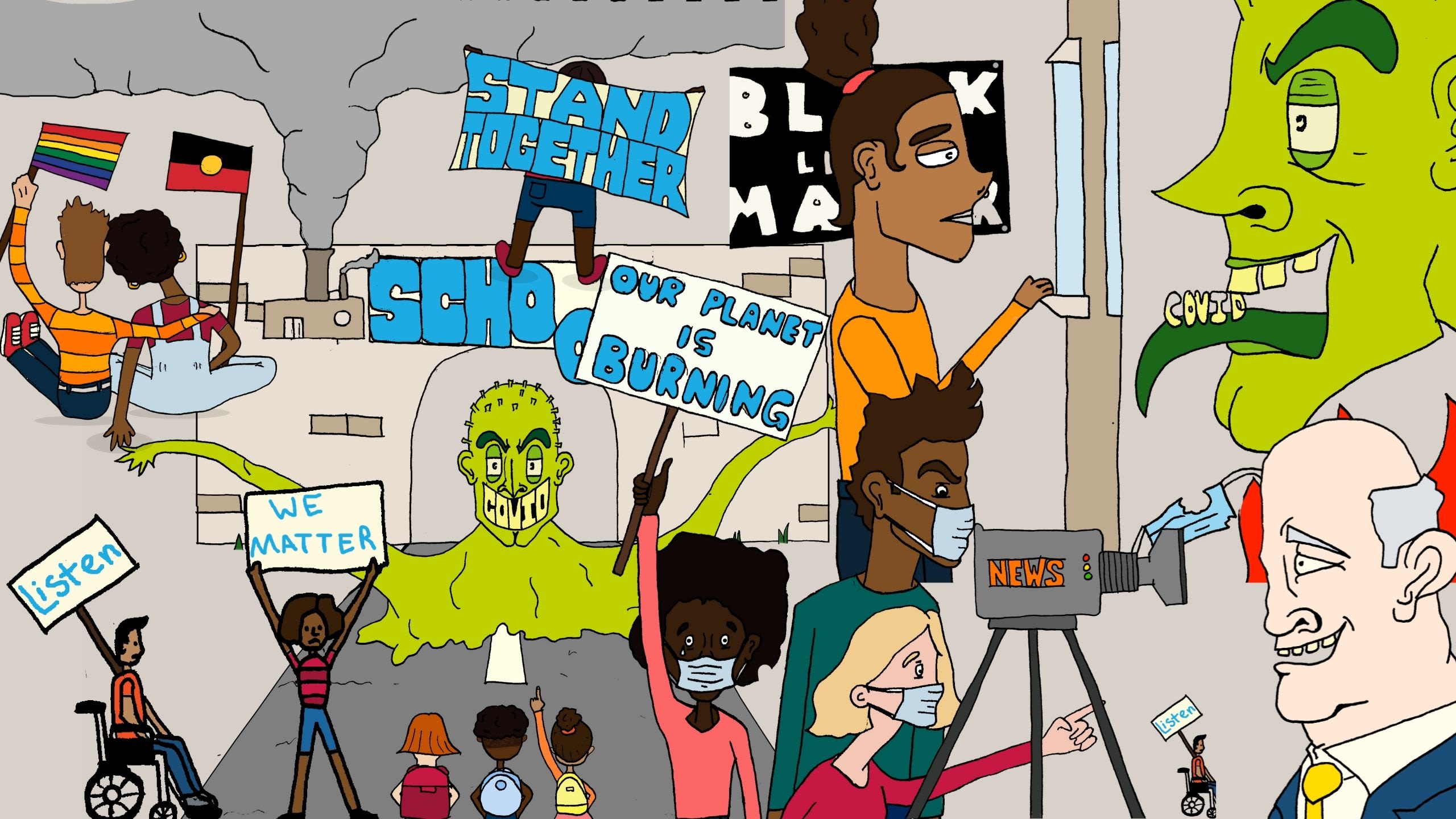
Meet Indiana, 19, and Harper, 17, the designer and artist of the ‘Children’s Voices in a Changing World’ children’s report.
Each year, our Young Ambassadors talk with children and young people across Australia about issues that affect their lives. Their views are then compiled into a report and presented to our country’s leaders in Canberra.
Hear what Indiana, a former Young Ambassador, and her brother Harper have to say about using their voice and artistic talent to advocate for the rights of young people.


Indiana, 19
Indiana, 19

Harper, 17
Harper, 17
“I learnt in my term as a Young Ambassador that children are experts in their own lives,” says Indiana. “Although we are not experts at graphic design, we were able to add our perspective as young people to the illustrations.”
Working across several months, Harper drew the illustrations by hand and Indiana brought them to life digitally.
“I was inspired by the many walks of life that are all considered youth,” says Harper. “And how despite their many differences, they share similar struggles and experiences.”
"Involving young people in decisions that do or will affect them is extremely important."

GIVE THE WORLD A SHOT: Global
NO ONE IS SAFE,
UNTIL EVERYONE IS SAFE
Just $5 can deliver two doses to someone in a low-income country.
Click to 'Give The World A Shot'

